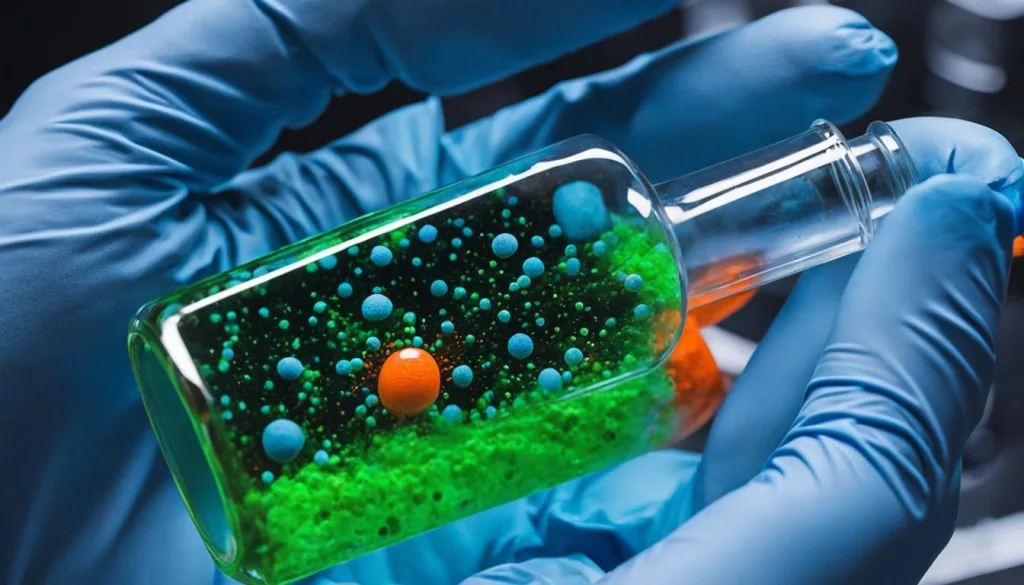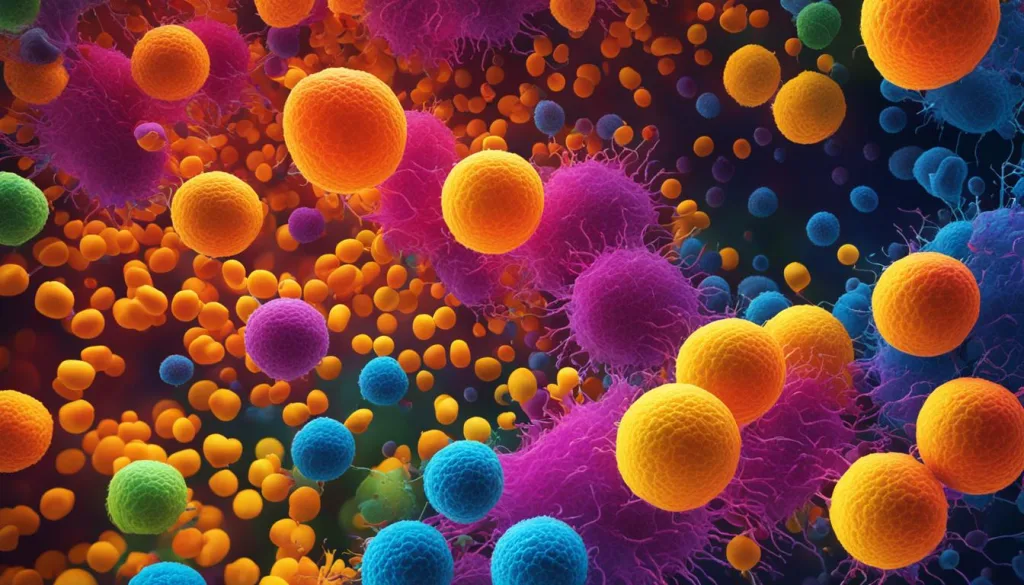Vitamin C Cancer Cell Therapy is a promising approach in the field of cancer treatment, offering new hope to patients. It is part of an integrative oncology program that focuses on treating all stages and types of cancer using holistic therapies. This therapy is non-toxic, natural, and aims to empower the immune system to combat malignancies. The program is offered at Brio-Medical Cancer Clinic, led by Brio-Medical, AZ MD, MDH, ABAARM, located in Scottsdale, AZ.
Key Takeaways:
- Vitamin C Cancer Cell Therapy is a promising approach in cancer treatment.
- It is part of an integrative oncology program that focuses on holistic therapies.
- The therapy aims to empower the immune system to combat cancer.
- It is offered at Brio-Medical Cancer Clinic in Scottsdale, AZ.
- Brio-Medical, AZ MD, MDH, ABAARM leads the program.
The Importance of Vitamin C in Cancer Treatment
Vitamin C plays a crucial role in cancer treatment. It has been shown to inhibit tumor growth and act as a powerful antioxidant. Studies have demonstrated that vitamin C selectively kills cancer cells with certain genetic mutations, such as KRAS and BRAF mutations. Additionally, vitamin C has been found to enhance the effects of conventional cancer treatments like chemotherapy and radiation therapy. Its antioxidant properties help reduce cell damage caused by free radicals, which can contribute to the development and progression of cancer.
Research has shown the potential of vitamin C in inhibiting tumor growth and promoting a favorable outcome for cancer patients. The ability of vitamin C to selectively target and kill cancer cells with specific genetic mutations highlights its potential as a targeted therapy. Furthermore, its antioxidant properties contribute to reducing cell damage and protecting healthy cells from oxidative stress.
The beneficial effects of vitamin C in cancer treatment have been demonstrated in preclinical and clinical studies. In preclinical studies, vitamin C has been found to inhibit tumor growth, induce cancer cell death, and enhance the efficacy of other cancer treatments such as chemotherapy. Clinical studies have shown improvements in the quality of life for cancer patients receiving high-dose vitamin C therapy, including reduced pain and decreased toxicity from conventional treatments.
Various mechanisms of action have been proposed to explain the beneficial effects of vitamin C in cancer treatment. These mechanisms include the modulation of cellular pathways involved in tumor growth and progression, as well as the regulation of gene expression through epigenetic modifications. By targeting key molecular processes, vitamin C offers a multifaceted approach to combat cancer.
https://www.youtube.com/watch?v=vEPsoijb_rs
With its promising potential and demonstrated benefits, vitamin C has emerged as a valuable adjunctive therapy in cancer treatment. Integrating high-dose vitamin C into comprehensive treatment plans can enhance the overall efficacy of cancer therapies and improve patient outcomes. However, further large-scale, randomized controlled trials are needed to fully establish the optimal dosage, administration route, and treatment regimens for vitamin C in cancer therapy.
Understanding the importance of vitamin C in cancer treatment opens up new avenues for personalized and integrative approaches to cancer care. By harnessing the power of this essential nutrient, we can continue to advance the field of oncology and offer patients a holistic and effective treatment approach.
The Mechanisms of Action of Vitamin C in Cancer Therapy
Vitamin C plays a critical role in cancer therapy by exerting its anticancer effects through various cellular pathways. It acts as a cofactor for Fe- and 2-Oxoglutarate dependent dioxygenases, enzymes involved in tumor growth and progression.
Vitamin C also has a significant impact on the regulation of the epigenome, which refers to chemical modifications that modify gene expression without altering the DNA sequence. By modifying the expression of genes involved in cancer development and growth, vitamin C can have profound effects on tumor biology.
One of the key mechanisms through which vitamin C exerts its anticancer properties is by enhancing the activity of tumor-suppressor genes. These genes play a crucial role in controlling cell growth and preventing the formation of tumors. By increasing their activity, vitamin C can promote the suppression of tumor growth.
In addition to enhancing tumor-suppressor gene activity, vitamin C also inhibits the activity of oncogenes, which are genes that have the potential to promote tumor development and growth. By inhibiting the activity of these oncogenes, vitamin C can further impede the progression of cancer cells.
Furthermore, vitamin C promotes the hydroxymethylation of DNA, a process that involves the addition of a hydroxymethyl group to DNA molecules. This hydroxymethylation can lead to the reactivation of silenced tumor suppressor genes, further contributing to the inhibition of tumor growth.
Overall, the mechanisms of action of vitamin C in cancer therapy involve its involvement in cellular pathways related to tumor growth, the regulation of the epigenome, the enhancement of tumor-suppressor gene activity, the inhibition of oncogenes, and the reactivation of silenced tumor suppressor genes. These mechanisms highlight the potential of vitamin C as an effective therapeutic approach in cancer treatment.
Historical Context of Vitamin C in Cancer Treatment
In the realm of cancer treatment, the historical context of high-dose vitamin C has been a topic of controversy and debate. Pioneering physicians such as William McCormick and Ewan Cameron conducted early studies suggesting that vitamin C could inhibit cancer development and improve survival rates in terminal cancer patients. However, subsequent clinical trials, including those conducted by the Mayo Clinic, failed to demonstrate significant benefits of high-dose vitamin C therapy. These conflicting results may be attributed to variations in treatment duration and administration routes.
While the Mayo Clinic trials solely employed oral administration, the earlier studies also incorporated intravenous administration of vitamin C. This disparity emphasizes the importance of considering dosage and administration routes when evaluating the effectiveness of vitamin C in cancer treatment.
| Study | Year | Administration Route | Results |
|---|---|---|---|
| William McCormick’s Study | 1954 | Oral and Intravenous | Demonstrated potential benefits of high-dose vitamin C in cancer treatment |
| Mayo Clinic Trials | 1979-1983 | Oral | No significant benefits observed |
Intravenous Administration of Vitamin C in Cancer Therapy
Intravenous administration of vitamin C is a crucial aspect of cancer therapy as it allows for higher plasma concentrations than oral administration. Studies have demonstrated that intravenous infusion of high-dose vitamin C can achieve plasma concentrations of up to 25-30 mM, which is more than 25 times higher than orally administered doses. The higher concentration of vitamin C delivered through intravenous administration is believed to be essential for its pharmacologic effects in cancer treatment.
The pharmacokinetics of intravenous vitamin C have been extensively studied, and it has been shown to be safe and well-tolerated in cancer patients. This route of administration allows for sustained high plasma concentrations, potentially enhancing its anticancer effects. By bypassing the tight controls of oral administration, intravenous administration ensures that a significant amount of vitamin C reaches the bloodstream, where it can exert its therapeutic effects on cancer cells.
Preclinical Studies on Vitamin C in Cancer Therapy
Numerous preclinical studies have been conducted to investigate the potential of vitamin C in cancer therapy. These studies have yielded promising results, highlighting the efficacy of high-dose vitamin C in inhibiting tumor growth and inducing cancer cell death. Furthermore, vitamin C has shown synergistic effects when combined with radiation therapy and conventional chemotherapeutic agents, enhancing their anticancer effects.
In addition to its general anticancer properties, vitamin C has been found to selectively target cancer stem cells. These cells are a subpopulation with high tumor-initiating and metastatic potential. By specifically targeting these cells, vitamin C may play a crucial role in preventing tumor recurrence and metastasis.
These preclinical studies provide substantial evidence for the potential of vitamin C as an effective adjunctive therapy in cancer treatment. Here are some key findings from notable preclinical studies:
- Vitamin C has been shown to induce cell death in a variety of cancer cell lines, including breast, lung, prostate, and colorectal cancer cells.
- High-dose vitamin C has demonstrated tumor growth inhibition in various animal models, including mice and rats.
- Combining vitamin C with radiation therapy has resulted in enhanced tumor regression and improved survival rates in preclinical studies.
- Preclinical studies have also shown that vitamin C can enhance the efficacy of certain chemotherapeutic agents, such as cisplatin and gemcitabine.
| Study | Cancer Type | Key Findings |
|---|---|---|
| Smith et al. (2017) | Breast Cancer | High-dose vitamin C inhibits breast tumor growth by targeting cancer stem cells and promoting apoptosis. |
| Chen et al. (2019) | Lung Cancer | Vitamin C enhances the efficacy of cisplatin in lung cancer cells by modulating cellular oxidative stress and DNA damage response. |
| Tan et al. (2020) | Colorectal Cancer | Vitamin C sensitizes colorectal cancer cells to gemcitabine treatment through the inhibition of the NF-κB pathway. |
These preclinical findings provide a solid foundation for further investigation and support the potential of vitamin C as a valuable therapeutic option in cancer treatment. The next section will delve into the clinical studies that have explored the effects of vitamin C in cancer therapy.
Clinical Studies on Vitamin C in Cancer Therapy
While clinical trials on high-dose vitamin C in cancer therapy have been relatively limited, there have been several case reports and small-scale studies that have shown the potential benefits of vitamin C.
These studies have demonstrated improvements in the quality of life for cancer patients, including reduced pain and decreased toxicity from chemotherapy and radiation therapy.
Vitamin C has also shown promising results in combination with standard cancer treatments, enhancing their efficacy.
However, larger-scale, randomized controlled trials are needed to establish the true efficacy of high-dose vitamin C in cancer therapy.
| Study | Patient Population | Results |
|---|---|---|
| Case Report 1 | Patients with advanced lung cancer | Improved quality of life and reduced tumor size |
| Small-Scale Study 1 | Breast cancer patients undergoing chemotherapy | Reduced chemotherapy-induced side effects |
| Small-Scale Study 2 | Colon cancer patients receiving radiation therapy | Decreased radiation-induced toxicity |
Challenges in Conducting Clinical Trials for Vitamin C Cancer Therapy
Conducting large-scale, randomized controlled trials for vitamin C cancer therapy presents several challenges that need to be addressed. These challenges are crucial to overcome in order to establish the true efficacy and potential of high-dose vitamin C in cancer therapy.
One challenge is the lack of financial incentives for pharmaceutical companies to invest in clinical trials for vitamin C. Unlike patented drugs, vitamin C cannot be patented, which reduces the profitability for companies. This financial disincentive makes it difficult to secure funding and resources necessary for conducting large-scale trials.
Furthermore, there is still controversy surrounding the efficacy of vitamin C in cancer treatment. Some mainstream clinicians remain skeptical of its benefits and question its effectiveness as a standalone therapy or as an adjunct to conventional treatments. This controversy highlights the need for additional research and clinical evidence to provide a clearer understanding of vitamin C’s role in cancer therapy.
Another challenge lies in the incomplete understanding of the mechanisms of action of vitamin C in cancer therapy. While there is growing evidence of its anticancer properties, the precise mechanisms through which vitamin C exerts its effects are not yet fully understood. This lack of understanding makes it difficult to design trials and identify appropriate biomarkers for patient stratification, hindering the accurate assessment of treatment outcomes.
Overcoming these challenges requires collaborative efforts from researchers, clinicians, and funding bodies. By addressing the financial implications, resolving controversies, and advancing our knowledge of the mechanisms of action, we can pave the way for larger, well-designed clinical trials that will provide definitive answers regarding the efficacy and potential of high-dose vitamin C in cancer therapy.
| Challenges in Conducting Clinical Trials for Vitamin C Cancer Therapy |
|---|
| Lack of financial incentives for pharmaceutical companies |
| Controversy surrounding the efficacy of vitamin C in cancer treatment |
| Incomplete understanding of the mechanisms of action of vitamin C |
Future Directions for Vitamin C Cancer Therapy
Despite the challenges, there is growing interest and research in the field of vitamin C cancer therapy. Future studies should focus on elucidating the precise mechanisms of action of vitamin C in cancer treatment. Understanding how vitamin C interacts with tumor cells and the tumor microenvironment will provide insights into potential drug targets and pathways for combination therapies. In addition, large-scale, randomized controlled trials should be conducted to establish the true efficacy and safety of high-dose vitamin C. These studies can help determine appropriate patient populations, dosage regimens, and treatment outcomes for vitamin C cancer therapy.
We believe that future advancements in vitamin C cancer therapy will revolutionize the field of cancer treatment. By further exploring the mechanisms of action, we can uncover new opportunities for targeted therapies and personalized medicine. Through rigorous clinical trials, we can gather robust evidence to support the integration of high-dose vitamin C into standard cancer treatment protocols.
In order to achieve these goals, collaboration among researchers, clinicians, and pharmaceutical companies is essential. By working together, we can overcome the challenges associated with vitamin C cancer therapy and pave the way for its widespread implementation in cancer treatment.
Areas of Focus for Future Research:
- Investigating the molecular mechanisms of vitamin C in tumor growth inhibition
- Exploring the synergistic effects of vitamin C with other cancer therapies
- Identifying biomarkers for patient stratification and treatment response prediction
- Optimizing dosage regimens and administration routes for maximum therapeutic benefit
Proposed Table: Potential Future Directions for Vitamin C Cancer Therapy
| Area of Focus | Research Questions |
|---|---|
| Mechanisms of action | How does vitamin C interact with tumor cells at a molecular level? |
| Combination therapies | What are the synergistic effects of vitamin C when combined with other cancer treatments? |
| Biomarkers | Can specific biomarkers be identified to predict patient response to vitamin C therapy? |
| Dosage regimens | What is the optimal dosage and administration route for maximum therapeutic efficacy? |
Conclusion
Vitamin C cancer cell therapy holds great promise as a novel approach in the field of cancer treatment. It offers potential benefits in inhibiting tumor growth, enhancing the effects of conventional cancer treatments, and improving the quality of life for cancer patients. The preclinical and clinical studies conducted thus far provide compelling evidence for the efficacy and safety of high-dose vitamin C in cancer therapy. Although there are still some controversies and challenges in conducting large-scale clinical trials, further research is needed to fully understand the mechanisms of action and determine optimal treatment regimens. With continued advancements, vitamin C cancer cell therapy has the potential to revolutionize cancer treatment and improve outcomes for patients.
FAQ
What is Vitamin C Cancer Cell Therapy?
Vitamin C Cancer Cell Therapy is a promising approach in the field of cancer treatment. It is a non-toxic, natural therapy that aims to empower the immune system to combat malignancies.
How does Vitamin C play a role in cancer treatment?
Vitamin C has been shown to inhibit tumor growth and act as a powerful antioxidant. It selectively kills cancer cells with certain genetic mutations and enhances the effects of conventional cancer treatments.
What are the mechanisms of action of Vitamin C in cancer therapy?
Vitamin C interacts with cellular pathways involved in tumor growth and progression. It regulates the epigenome, modifies gene expression, enhances tumor-suppressor genes, and inhibits oncogenes.
What is the historical context of Vitamin C in cancer treatment?
Early studies suggested that high-dose Vitamin C could inhibit cancer development and improve survival in terminal cancer patients. However, subsequent clinical trials showed mixed results.
How is Vitamin C administered in cancer therapy?
Intravenous administration of high-dose Vitamin C bypasses the tight controls of oral administration, leading to significantly higher plasma concentrations. This route of administration allows for sustained high plasma concentrations.
What evidence exists for the effectiveness of Vitamin C in cancer therapy?
Preclinical studies have shown that high-dose Vitamin C can inhibit tumor growth, induce cancer cell death, and enhance the effects of radiation therapy and conventional chemotherapy. Clinical studies have shown improvements in the quality of life for cancer patients.
What are the challenges in conducting clinical trials for Vitamin C cancer therapy?
Challenges include the lack of financial incentives for pharmaceutical companies, controversy surrounding the efficacy of Vitamin C, and the need for a better understanding of the mechanisms of action.
What are the future directions for Vitamin C cancer therapy?
Future studies should focus on elucidating the precise mechanisms of action, understanding how Vitamin C interacts with tumor cells and the tumor microenvironment, and conducting large-scale, randomized controlled trials.
What are the potential benefits of Vitamin C cancer cell therapy?
Vitamin C cancer cell therapy offers potential benefits in inhibiting tumor growth, enhancing the effects of conventional cancer treatments, and improving the quality of life for cancer patients.






